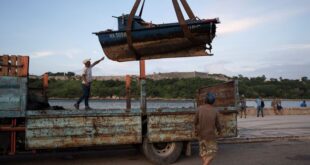LISBON (Reuters) – Brazil is ready to help Portugal’s government implement measures in reparation for the legacies of transatlantic slavery and colonialism by sharing its own experiences and good practices, a visiting Brazilian minister said on Wednesday.
Portuguese President Marcelo Rebelo de Sousa said in April his country was responsible for crimes committed during transatlantic slavery and the colonial era, and suggested there was a need for reparations.
Anielle Franco, Brazil’s minister of racial equality, said those comments were significant because for many years the wrongs of the past had gone largely unrecognised by those in power.
“It was a first step,” she told Reuters on the sidelines of a legal forum, adding that she was open to sharing good practices of measures already in place in Brazil, such its racial quota system.
“Reparation is not just about (financial) payments… reparation is laws, public policies, education, giving visibility to people… it’s about building a more dignified future,” she said.
Rebelo de Sousa’s comments sparked a national debate in Portugal and strong criticism from right-wing parties. Far-right party Chega, which is on the rise, proposed charging him with treason.
In over four centuries, nearly 6 million Africans were kidnapped and forcibly taken across the Atlantic on Portuguese vessels and sold into chattel slavery, primarily in Brazil, a former colony.
Opponents of reparations say contemporary states should not be held responsible for historical slavery. Advocates say action is needed to address its legacies, such as systemic and structural racism.
After Rebelo de Sousa’s remarks, Portugal’s centre-right government said it would not initiate any reparation process, and called for cooperation instead.
Franco said she believed there would be openness from the Portuguese government to talk about the issue.
The idea of paying reparations or making other amends has gained momentum worldwide, including efforts to establish a special tribunal on the issue. Franco said Brazil was likely to support the establishment of such a tribunal.
Cape Verde President Jose Maria Neves said this month the rise of the far-right in Portugal and other countries had made it difficult to hold a serious debate about reparations. Franco shared a similar view.
“But, at the same time, I see it as an obligation for us to continue to fight,” she said.
(Reporting by Catarina Demony; Editing by Timothy Heritage)
 BeritaKini.biz Berita Viral Terkini di Malaysia
BeritaKini.biz Berita Viral Terkini di Malaysia





